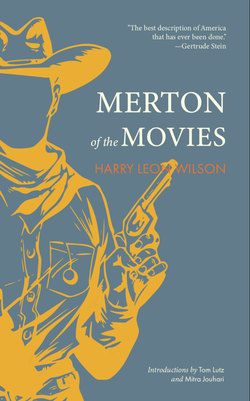Читать книгу Merton of the Movies - Harry Leon Wilson - Страница 5
На сайте Литреса книга снята с продажи.
ОглавлениеForeword
Mitra Jouhari
If you’ve watched any film about Hollywood in the last millennium or so, you probably know on some level that Hollywood is built on delusion, artifice, and big fat stacks of cash. It’s a glossy, superficial place that draws in doe-eyed dreamers from all over the world armed with little more than vague plans to make it big, only to be unceremoniously chewed up and spat out before they’ve had a chance to unpack. One by one, these self-styled starlets get enough doors slammed in their face (if they make it to the room at all) that they decide it’s time to head back to whatever life they thought they could beat. They drop their embossed headshots in the trash and leave their dignity somewhere between the studio lot and the bus station, where snide attendants are all too eager to sell them one-way tickets back home.
To Merton Gill, the not-so-humble hero of Harry Leon Wilson’s 1920s classic, Merton of the Movies, Hollywood’s got a Merton Gill-shaped hole that needs filling. In his mind, Hollywood is a meritocracy in which he’s sure to succeed … if he could just get there. Armed with what he believes to be a potent combination of good looks, dedication, and “humility,” Merton Gill is counting the seconds until he can introduce the world to his glamorous alter ego: Clifford Armytage. Those who survive in Hollywood need confidence, and Merton’s got more than enough to go around. He’s a certified actor — with the mail-in diploma to prove it! — and is convinced he’s destined for greatness.
As the saying goes, the first step is admitting you have a problem. The second, of course, is going to Los Angeles to try to become an actor.
He stakes out a studio that makes films starring a woman on whom he has a crush — one has to follow one’s heart. The lucky lady is Beulah Baxter, and Merton’s in love with her beauty and stunt-making before he even sets foot on set. But then, bit by bit, the walls on his beautifully constructed mental projection of Hollywood and those who live and work there come tumbling down. Merton eventually finds himself out of cash and squatting on a studio lot … until Sarah Nevada “Flips” Montague, a comedienne and stunt woman, takes pity on him and finds him work. As filming begins, his co-stars make strange, almost comedic choices in their performances, but Merton acts up a storm in a dramatic role perfected for a Real Artist™ suited for straight man fame. And so it begins.
Not long after, Merton finds himself at the premiere of his big film and in a prison of his own making. Slowly but surely he realizes he’s been duped. He is the unwitting star of the most disgusting film project an actor can be a party to: a big, broad comedy. Cynical Hollywood types have preyed on his naïvete, tricking him into being the butt of the joke. Back in Kansas, he had seen himself as a big-city star trapped in a joke of a small town. Now, in the big city, the joke isn’t just on him, it is him.
Enter the heroine, Flips, who saves Merton from himself and gives him his only real chance at being a star. Behind every man there’s a great woman, and behind every great woman there’s a man who questions her every step of the way until he realizes that she was right all along. In 2019, as I write this, what is more timely than the tale of a man failing up, unable to acknowledge the comedy in how seriously he takes himself, thanks to his outsize ego?
And yet, through all of Merton’s delusions of grandeur, through all his condescension, through all his stubborn insistence that he’s destined for more, he remains sympathetic. There’s something comforting about someone who believes in himself against all odds, who follows a dream blindly, who isn’t scared of failing and doesn’t care what others have to say. In the end, it makes sense that his performance makes people laugh. There is nothing funnier than wanting to become an actor. There is nothing more foolish than thinking that if you pick up stakes and go to Hollywood, things will work out. His flexibility (translation: inability to admit he was bamboozled) allows him to live a life of glamour and happiness (translation: wealth and complacency). He’s a movie star, just not the way he thought he would be.
So what makes a movie star, anyway? As evidenced on the sets that Merton Gill frequents, it’s not necessarily talent or beauty or intelligence or any of the things one might hope would lead to mainstream success. Judging by the Merton who walks up to the casting office day in and day out, success looks like dedication. Judging by the Merton who fantasized about his larger-than-life Hollywood persona back in Gashwiler’s store, it might reek a bit of delusion. So for the hopeful young small-town wannabe, what’s the key to Hollywood stardom? Dedication or delusion? If you ask Merton Gill, the answer might be: why choose?
